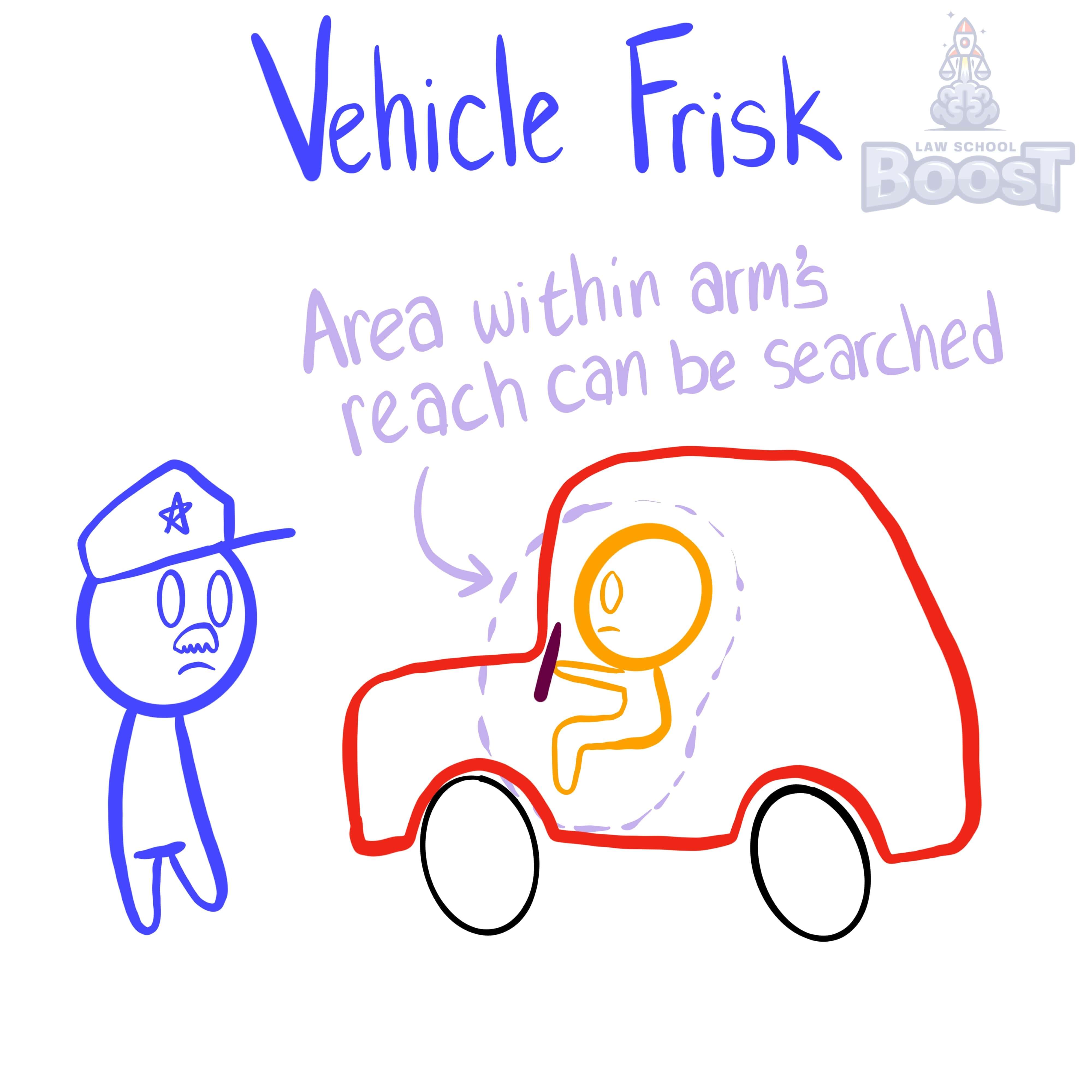🫥
Criminal Procedure • Exclusionary Rule
CRIMPRO#009
Legal Definition
STOP: Police can briefly detain a person without probable cause where they have reasonable suspicion supported by articulable facts of criminal activity, judged by the totality of the circumstances. A police officer can stop a car if they have reasonable suspicion a law has been violated.
FRISK: Police can pat down an individual they stop to search for a weapon if they have reasonable suspicion the individual is armed and dangerous, and can also frisk the vehicle.
FRISK: Police can pat down an individual they stop to search for a weapon if they have reasonable suspicion the individual is armed and dangerous, and can also frisk the vehicle.
Plain English Explanation
People in the United States are generally free to move around and explore the country without fear of being interrupted by police. However, the law allows some circumstances where police can temporarily suspend those freedoms in the pursuit of crime prevention or investigation. But where is the line? Obviously, if a cop saw you shove a bag of white powder labeled "crack" into your pants, he'd have a right to stop you and check things out, but what happens when things are a bit more abstract? Well, the answer is "it depends how abstract."
The line that the law has created in order to stop someone is "reasonable suspicion supported by articulable facts," meaning it is enough of a "gut feeling" that the police officer can put it into words and explain to someone. For example, if Officer stops Bob standing outside of a bank because Bob "looked at him funny," this isn't a lawful stop. However, if Officer stops Bob running out of a bank because Bob looked at him nervously while an alarm could be heard in the background and $20 bills fell out of Bob's pockets, suddenly the Officer has a reasonable suspicion that Bob robbed the bank, and can articulate his suspicion in the same way described here.
After an Officer stops someone, they can choose to frisk them if they have a reasonable suspicion that the person they have stopped may have a weapon on them. Note that if a person has been stopped because they are suspected of a crime, then unless they are naked there is likely always a chance they have a weapon on them (like a pocket knife), but whether they are considered dangerous depends on how well you argue it on the exam. Also worth noting, if an officer is performing a stop on a vehicle, they can use the same justification to frisk the vehicle, meaning search the areas within the vehicle that are within immediate reach of the occupants within it. The goal is to reduce the probability that an Officer will be harmed by a surprise attack during an otherwise inquisitive stop.
The line that the law has created in order to stop someone is "reasonable suspicion supported by articulable facts," meaning it is enough of a "gut feeling" that the police officer can put it into words and explain to someone. For example, if Officer stops Bob standing outside of a bank because Bob "looked at him funny," this isn't a lawful stop. However, if Officer stops Bob running out of a bank because Bob looked at him nervously while an alarm could be heard in the background and $20 bills fell out of Bob's pockets, suddenly the Officer has a reasonable suspicion that Bob robbed the bank, and can articulate his suspicion in the same way described here.
After an Officer stops someone, they can choose to frisk them if they have a reasonable suspicion that the person they have stopped may have a weapon on them. Note that if a person has been stopped because they are suspected of a crime, then unless they are naked there is likely always a chance they have a weapon on them (like a pocket knife), but whether they are considered dangerous depends on how well you argue it on the exam. Also worth noting, if an officer is performing a stop on a vehicle, they can use the same justification to frisk the vehicle, meaning search the areas within the vehicle that are within immediate reach of the occupants within it. The goal is to reduce the probability that an Officer will be harmed by a surprise attack during an otherwise inquisitive stop.
Visual Aids

Related Concepts
What are special needs search exceptions to the warrant requirement?
What are the 5 exceptions to the fruit of the poisonous tree exclusionary rule?
What are the exceptions to the warrant requirement?
What are the wiretapping and eavesdropping exceptions to the warrant requirement?
What does the 4th Amendment protect against?
What is a facially valid warrant?
What is the automobile exception to the warrant requirement?
What is the consent exception to the warrant requirement?
What is the evanescent evidence, and hot pursuit exception to the warrant requirement?
What is the exclusionary rule?
What is the fruit of the poisonous tree doctrine?
What is the good faith defense to an invalid warrant?
What is the harmless error rule?
What is the plain view exception to the warrant requirement?
What is the search incident to arrest exception to the warrant requirement?
What is the stop and frisk exception to the warrant requirement?
When are police checkpoints valid?
When are police excused from knocking and announcing?
When does a person have automatic standing and a reasonable expectation of privacy in a 4th Amendment violation claim?
When do individuals have no standing and no reasonable expectation of privacy in a 4th Amendment violation claim?
When is a warrant based on a tip by an informant sufficient?
When is the exclusionary rule inapplicable?


